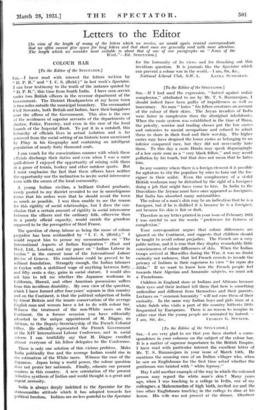[To the Editor of the Srarrazon.] SIR,—If I had used
the expression, "hatred against unfair complexion," attributed to me by Mr. T. S. Ram'anujam, I should indeed have been guilty of impoliteness as well as inaccuracy. No man " hates " his fellow-creatures on account of the colour of their skins. The Aryan invaders of India 'were fairer in complexion than the aboriginal inhabitants. VVhen the caste system was established in the time of Mann, the priestly, warrior and trading classes put the low castes and outcastes to menial occupations and refused to admit them to share in their food and their worship. The higher castes may have despised the lower castes as belonging to an inferior conquered race, but they did not necessarily hate them. To this day a caste Hindu may speak disparagingly of a low caste man as a "very black fellow," and may avoid pollution by his touch, but that does not mean that he hates him.
In any country where there is a foreign clement it is possible for agitators to stir the populace by cries to turn out the for- eigner in their midst. Even the complacency of a stolid British workman may be disturbed by the sight of a foreigner doing a job that might have come to him. In India to the Dravidians the Aryans must have once appeared as foreigners. But India has absorbed many nationalities.
The colour of a man's skin may be an indication that he is a foreigner, but if he is disliked it is because he is a foreigner, not because his skin is fair or dark.
Therefore in my letter printed in your issue of February 28th I was careful to use 'the words "preference for fairness of complexion."
Your correspondent argues that colour differences are ignored on the Continent, and suggests that children should be taught to avoid colour prejudice. The French are a very polite nation, and it is true that they display remarkably little
consciousness of colour differences of skin. When the Indian troops arrived at Marseilles during the War, it was no doubt curiosity not rudeness, that led French crowds to invade the privacy of Indians in their eagerness to view " les repas des Sikhs." If we want to know how the French people feel towards their Algerian and Annamite subjects, we must ask a Frenchman.
Children in England stare at Indians and Africans because their eyes and their instinct tell them that here is something unfamiliar and different from themselves and their parents. Lectures on "common humanity" will not cure them of their curiosity. In the same way Indian boys and girls stare at a white Sahib who visits a part of the country hitherto little frequented by Europeans. There is no reason to imagine in either case that the young people are animated by hatred.—














































 Previous page
Previous page